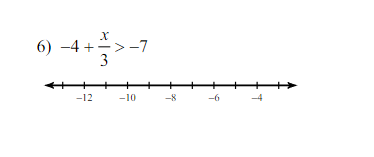-4 + x/3 > -7

Understand the Problem
The question is asking to solve the inequality -4 + \frac{x}{3} > -7 and determine the values of x that satisfy this condition. This involves isolating x and analyzing the inequality.
Answer
The solution to the inequality is \( x > -9 \).
Answer for screen readers
The solution to the inequality is ( x > -9 ).
Steps to Solve
-
Isolate the fraction To start solving the inequality, add 4 to both sides: $$ -4 + \frac{x}{3} + 4 > -7 + 4 $$ This simplifies to: $$ \frac{x}{3} > -3 $$
-
Multiply by 3 Next, eliminate the fraction by multiplying both sides by 3. Remember to maintain the inequality direction since 3 is positive: $$ 3 \cdot \frac{x}{3} > 3 \cdot (-3) $$ This results in: $$ x > -9 $$
-
Final Interpretation The solution indicates that any value of $x$ greater than -9 will satisfy the original inequality.
The solution to the inequality is ( x > -9 ).
More Information
This inequality tells us that the values of ( x ) that satisfy the condition are all real numbers greater than -9. Graphically, this can be represented on a number line with an open circle at -9, indicating that -9 itself is not included in the solution.
Tips
- Ignoring the direction of the inequality: When multiplying or dividing by a negative number, always remember to flip the inequality sign. Here, though, we didn't need that, as we multiplied by a positive number.
- Making arithmetic errors during simplification: Ensure each step is carefully calculated to avoid simple mistakes that lead to incorrect solutions.
AI-generated content may contain errors. Please verify critical information